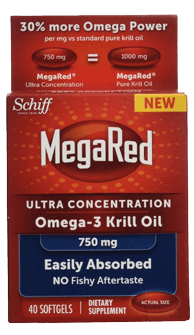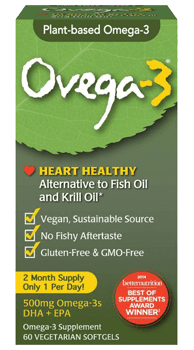For the past year, we've asked all of our Smarter Shoppers to send in reviews of their favorite products via e-mail, Facebook, and Twitter. We're proud to announce that we've received over one thousand submissions from all around the world, including all seven continents, 17 countries, and all of the 50 continental United States. In addition to the reviews, we've also collected research from the latest studies and clinical trials. We've gathered this data for you below, in our citations section.
We compiled this list of the top five products from these reviews and we've opened up the list for additional voting. We also bought and tested each of these products to complete our own reviews. However, we're always trying to improve our lists so if you have suggestions for products please e-mail us at Product@Smarter-Reviews.com.
Do I Really Need an Omega-3 Supplement?
The American Heart Association (AHA) recommends eating at least two, 3.5-ounce servings of fatty fish (salmon, mackerel, herring, lake trout, etc.) per week, while the National Health and Nutritional Examination Survey (NHANES) titled an article "U.S. adults are not meeting the recommended levels
The NHANES concluded that omega-3 fatty acids are deemed important and dietary supplementation—in addition to food sources—may need to be considered to achieve (omega-3) recommendations in the American population. 13
Omega-3 essential fatty acids are essential for a reason, and it's clear that supplementation may be needed to meet the daily amount our bodies use.
But how do we know which kind of omega-3 fatty acid supplement is best?
Smarter Reviews has spent months compiling extensive research
What are Omega-3 Essential Fatty Acids?
Omega-3 essential fatty acids are polyunsaturated fatty acids. Omega-3s are commonly found in fatty fish like salmon, small shellfish like krill, and in many vegetable oils. There are three main omega-3 EFAs: eicosapentaenoic acid (EPA), docosahexaenoic acid (DHA), and alpha-linolenic acid (ALA). ALA is the most common omega-3 and is found in vegetable oil, nuts, flax seeds, leafy vegetables, and some animal fats.*3 EPA and DHA are commonly found in fatty fish.3
Omega-3 101: Omega-3 Essential Fatty Acids Revealed
Omega-3 essential fatty acids (EFAs) are found throughout our bodies—in fact, they help protect and insulate each and every one of our cells. Perhaps one of the reasons why omega-3 EFAs are so popular is because of the wide range of health benefits they have been shown to provide in hundreds of clinical studies throughout the years.
Furthermore, according to the Harvard T.H. Chan School of Public Health, omegas "have been shown to help prevent heart disease and
Unfortunately, our bodies cannot produce omega-3 fatty acids. That's just one reason why it is imperative to obtain EFAs through the foods we eat, and through dietary supplementation.
Choosing the right Omega-3 Supplement
Omega-3 EFAs are the most widely used supplements in the United States, and many companies are making omega supplements that are—unfortunately—not necessarily in the consumer's best interests.
Reading the label is one of the most important things you can do to prevent a bad experience when choosing the best omega-3 supplement. The chart below highlights things you should avoid and
Avoid:
- Heavy metal contamination (mercury and PCBs)*
- Artificial colors*
- Caramel color*
- Dioxins
Look For:
- Omega-3 source (preferably Krill)
- Total Omega-3 content*
- High EPA and DHA*
What is the Best Omega-3 Source?
When choosing the best omega-3 supplement, one of the main things you should look for is the source of omega. Fish oil has traditionally been a popular source for omega-3s, but due to the emergence of heavy metals in our oceans, krill oil has significantly grown in popularity.
Over the past year, many of our Smarter Shoppers have asked, "What omega-3 supplement should I take, krill oil or fish oil?"
We researched the answer and found several reasons why krill oil may be the superior choice.
Krill Oil Vs. Fish Oil
Absorption
- Krill and fish oil similarly contain EPA and DHA, but they differ in the way that the omegas are bonded. The omegas in krill oil are mostly bonded to phospholipids, while in fish oil they are bonded to triglycerides. The fat cells in humans are also in phospholipid form. Studies show that phospholipids are more effective for absorption. We suggest finding a formula with at least 500 mg of phospholipids for real absorption power.14, 21
Purity
- In addition to krill oil's greater absorption, it's known to have less fishy aftertastes when a
high quality supplement is made with pure krill oil.
Astaxanthin
- This powerful antioxidant isn't available in fish oil, but it's found in high quantities in lobster, crayfish
and krill.15,17 Astaxanthin boosts skin health and has been shown to increase good cholesterol levels.16,18 To see results, our research found that you need at least 2 mg of astaxanthin per serving.
***Safety Warning*** - A notable concern when deciding to choose between fish oil and krill oil is the rising contamination levels in our oceans.
-
Mercury
Mercury is a highly reactive heavy metal, and the long-term exposure to low levels of mercury are highly misunderstood.1,8 Mercury may make people susceptible toarherosclerotic disease—a disease in which plaque builds inside your arteries.18 -
PCBs
PCBs—or polychlorinated biphenyls—are a group of manufactured organic chemicals. PCBs account for 209 individually chlorinated chemicals.19 PCBs typically have a higher concentration in fish, even with low levels of PCBs in the water.
The major concerns with these two contaminants are that they are persistent in our oceans, and they accumulate up the food chain. Basically, big fish eat little fish, and since big fish are higher up the food chain, the concentration levels of heavy metals (mercury and PCBs) has an increased chance of being dangerous to humans. 19-20
Since fish oil may be extracted from the tissues of fish that are higher up the food chain, it might be more contaminated. However, krill are at the very bottom of the food chain, their lifespans are shorter than fish, and since krill eat algae they are relatively free of dioxins and PCBs. 20
-
Try to Avoid: Amazon Reviews
Millions of Americans look to Amazon reviews before purchasing their products, but most don’t realize that up to 60% are written by individuals paid to leave positive feedback. Risking your health with reviews that are likely false is too dangerous a game to play when you’re choosing an ingestible supplement.
2018'S TOP 5 OMEGA-3 SUPPLEMENT BRANDS ON THE MARKET
We tested 72 different omega-3 supplements, and based on our 5 pillars of excellence: ingredient safety, projected effectiveness, value, return policy, and customer satisfaction, we discovered the Top 5 Omega-3 Supplements of 2018.

.png)








